- Home
- Pip Ballantine
Thrilling Tales of the Ministry of Peculiar Occurrences Page 20
Thrilling Tales of the Ministry of Peculiar Occurrences Read online
Page 20
“Leave that to me.” He shouldered his rifle and took aim down the scope.
The nose section had the portholes from the Hare, and for that, Vasily felt thankful. He could put a bullet through those. Through the windows, lit by the dim glow of dials and indicators, the agent spied his Lev nemesis. The man leaned forward, oblivious to Vasily’s presence, and flicked a switch on his console. Strains of Anton Arensky’s Elegea from his first Piano Trio saturated the air through loudspeakers, so deafening as to be heard for miles around. The melancholic tune was almost like an apology to the innocent people of Peter for the fate about to befall them. The soldier-king relaxed and closed his eyes, letting the sounds of the music take him to his final destination.
Vasily always hated the melodramatic villains.
“Can you make this shot?” asked Zhenya.
“Of course, I can,” he bit back, but once the anemometer on his scope popped up, his certainty melted away.
The scope’s windage spun far too fast to get a measurement. If he fired, it would have to be on gut instinct. He tried to imagine the bullet’s path, but he found himself aiming far in front of the Duck, hoping the arc would bring the shot back into its airframe. He threw back the cockbolt and took comfort in the feel of the round chambering. He sucked in a deep breath. With a moonlit cloud as his mark, he counted down, then fired.
They saw a tiny spark as the bullet clanged off the Duck’s hull, but all its windows remained intact. Through his scope, Vasily saw the soldier-king startle upright and look in his direction.
The agent let out his breath as the Duck took evasive manoeuvres, diving straight at the city. “Oh, bollocks.”
“Idiot!” hissed Zhenya, and Vasily’s stomach flipped as she raced downward after the Lev craft.
His rifle lost its weight as gravity, his long-time friend, abandoned him. His hair floated, his pockets emptied, and he held tight to Zhenya, trying not to scream in her ear. They raced through the clouds toward the falling Duck, and sparkling Peter appeared in their view, majestic like a bed of gold coins. A million lamplights—each of them a house, or a person, or a family—spread below them. The Mortar had grown close to the Duck, and Vasily choked on the sulphur fumes of the Lev rocket engines.
One more round. Maybe, if he could hit the centre point of the nozzle, he could make it lose control. What good would that do? Would it blow up? Would that be better in the air than on the ground?
He levelled his rifle for his final shot.
“Not yet!” screamed Zhenya. “Wait for it!”
She cranked a lever all the way, and Vasily nearly fell out of the Mortar as it streaked downward, past the Duck, coming to hover directly in its path. Vasily had a straight shot up into the portholes, and he could see the surprised whites of the soldier-king’s eyes.
“Now!” she cried.
With a pull of the trigger, the viewport glass spider webbed with crimson strands, and Vasily knew his bullet had found its mark. With its pilot dead, all that remained was the Duck and Koschei’s wrath...
...crashing straight at them.
“What’s the plan?” he shouted.
The Duck spun lazily, chasing them toward the city. The exterior of the Mortar began to sparkle with strange energies, and Vasily smelled ozone. Zhenya’s hands deftly flickered over the controls as the diving crafts developed an incessant scream. The bomb was a mere ten feet away, and he could see the dead soldier-king’s face through the cracked glass. He looked from Zhenya, to the Duck, back to her, back to the bomb, and he knew he was shouting something, but he couldn’t tell what it was, because everything seemed to take a left turn all of a sudden. All sensations became only noise.
June 30, 1908
Podkamennaya Tunguska River Basin
14 Years Later
With a strange harshness, Vasily Zinchenko found that he could speak and move normally again. His disorientation caused him to drop his beloved rifle, which tumbled over the edge of their aircraft.
It became mild of temperature, shockingly hot to a man used to Russian winters. Weight finally returned to him as the Mortar levelled off and shot in the direction of the rising sun. The Duck fell behind him toward the black pines, which were a lot closer than he’d hoped. He didn’t know how the detonation on the Lev bomb worked, but he knew it would blow when it hit the ground.
“We’re too close!” he said.
“I don’t know where the next time jump point is.”
“It doesn’t matter! Just go there.”
She began to frantically work the controls again, and Vasily watched in horror as the Duck tumbled toward the forest. Energy once again shot through the ship. A flash blinded his eyes from where the Lev craft had fallen, and a sudden heat warmed his skin. Vasily could only hope it was the summer sun. He closed his eyes.
“Just jump!” he cried.
June 30, 1908
Podkamennaya Tunguska River Basin
26 Minutes Later
White. All was white.
The Ministry agent tested all his limbs for the second time in twenty-four hours, assuring himself of their presences. Hot wind tousled his hair, and he inhaled the sharp scent of smoke. He couldn’t see anything through his blind eyes, and he rested his cheek against Zhenya’s warm back.
“Miss Babikov?” he whispered.
“Yeah?”
“Are we alive?”
He felt her let out a long sigh through the fall of her shoulders. “Yeah, just a few minutes into the future,” she said. “Damn crack shot, you are.”
“And you’re not bad at... What is it you do? Time travel, I suppose?”
“That, and prepare for the worst,” she said, looking around their Mortar. “We have just enough shielding around us to keep the heat at bay.”
The light gradually became shadow, and Vasily opened his ailing eyes upon Hell. Pine trees had been laid low like piles of corpses, and granite had been blasted into orange glass for miles around. A tremendous column of smoke reached toward them as they flew, surveying the damage. Hot winds whistled past them, carrying clouds of cloying dust and flaming debris.
He swallowed dryly, thinking of the million people back in the intended target. Fourteen years prior. “My God... That could have been Peter. All of that, just to kill a few politicians.”
“But they failed, thanks to us.”
For minutes, they flew around the countryside, surveying the damage. If the gods had been looking for a place to chain forsaken Prometheus, they would have found it in Tunguska. The thought of what the Lev had nearly done to the imperial capitol would haunt Vasily’s dreams for years to come.
Zhenya eventually steered her mortar away from the devastation and out over Lake Baikal. The clear waters did much to calm Vasily’s mind, and soon, the agent felt peace return to his bones.
“I imagine my superiors will be surprised to hear how this all played out,” he finally said.
Zhenya gave a gruff laugh. “I hate to tell you this, farmboy, but they’ll never hear the story.”
He recoiled. “What?”
“No, I’m not going to kill you to preserve my secret,” she chuckled. “I don’t have to. Did you just forget what just happened? We time travelled. Into the future. By fourteen years.” She glanced at one of her panels and added, “And thirty-one minutes.”
“So the Ministry thinks—” Then Vasily nodded. “You can’t take me back, can you?”
“I don’t know how to say this, so I’m just going to say it. The next time jump will take us to New York City, for the 1964 World’s Fair. I don’t know what the old hag wanted us to do there.” She bit her lip. “Or I could just let you out here. I’m sure you could find your way back to some sort of sanity.”
Maybe it was because he couldn’t be surprised anymore after his fight with the Lev, maybe it was because he didn’t want to go home, anyway; somehow, though, he couldn’t bring himself to be angry, disappointed, or even dismayed about the fact that he was fourteen years removed
from everyone who knew him. Well, almost everyone, he thought, resting his cheek on her back.
For the second time in his life, he’d been abducted by Baba Yaga. This time, it suited him just fine.
“And you’d have me with you?”
She shrugged. “You’re a decent enough shot, and the guns only get better in the future. Maybe you could be my bodyguard. You’re certainly hideous enough.”
He smiled and she grimaced. He remembered his missing front tooth, and closed his mouth. “Maybe the dentists are better in the future.”
“Maybe so,” she said. “Only one way to find out.”
He nodded his head, and the Mortar disappeared into the blossoming sky, the sun stained orange with the smoke of the impact.
Our Lady of Monsters
Delilah S. Dawson
Paris, France
1889
When the shop girls screeched that a gorilla in a bowler hat was eating all the croissants, Anne-Marie fetched her gun…
As usual, she was disappointed by reality. He was just a man, albeit an enormous one, hunched over the boulangerie’s single table beside the baguettes, slathering croissants with jam and butter and shoving them into his maw with fingers the size of sausages. The shop girls cowered behind the counter. But not Anne-Marie Bouvier, for she was more than the average baker. And she hadn’t put away her pearl-handled revolver yet.
Anne-Marie pushed sweaty, blond curls out of her eyes, settled her spectacles firmly on her nose, and rounded the counter to face the brute. Her arms were crossed casually, the gun held firm in floury fingers. He simply had to leave; he clashed horribly with the lavender walls and Anne-Marie’s matching lilac gown.
“Je suis a vous, monsieur.”
The gorilla looked up and grinned, an unsettling streak of intelligence in his coffee-coloured eyes. Dabbing his lips with his cravat, he stood and loomed over her in his cheap, brown suit, ignoring the gun.
“If you’re really at me, love, I’ll take a pot of tea. These Frogs can’t seem to pull it off. Dunno what’s so hard about it. Water and leaves, roight?”
His accent was rough and lower class, utterly East End and a fair match for his scarred knuckles, grotesquely crooked nose, and dark-haired wrists. She’d known bruisers like him when she’d lived in London as a child. They’d tried to kiss her, and she’d run them all off. Crying.
“You’re speaking to a half-Frog, monsieur. And this is not a restaurant. Time to settle up.”
“Already paid. But maybe this’ll even things out, love?”
He fished around in his pocket and pulled out a familiar-looking ring. Anne-Marie gasped, her heart clamouring against her corset. Was it finally time?
“Where did you get that?”
His grin widened. “From Doctor Sound of the Ministry of Peculiar Occurrences, of course. These are the latest model so you might want to replace that antique you’re wearin’ currently, love.” When he held it out to her, she noticed a matching but much larger one digging into his own pinkie finger. He knotted his brow. “Well, supposed to be wearin’ anyway.”
“Dropped mine in the dough.” Heat rose in her cheeks as she snatched the ring and shoved it onto her finger. “Is there something more? He could’ve sent it by pigeon.”
“No need for par avion since I’m here, now is there?” He leaned in too close for comfort, and she caught the scent of cheap shaving lotion and Earl Grey lingering in his lapels, plus the smoke of a hypersteam train journey. “Time to wake up, Miss Bouvier. Ministry’s finally changing your status to active. It’s been twenty years since your agent training. Have you stayed sharp?”
Anne-Marie struggled not to shriek with joy. She’d been waiting for this moment, hoping for some message from whomever was in charge—Doctor Sound, he said the director’s name was—that would justify half a life spent languishing beside a hot oven, eating too many éclairs and hoping to someday follow in her mother’s footsteps as a field agent. Finally, she had her chance.
And this walking caveman wanted to know if she was still sharp?
Quick as a blink, her fist shot out and popped him in just the right place to knock the wind out of his gut. He doubled over, goggling like an eel.
“I’ve stayed sharp enough,” she said, a smirk bending her mouth
He stood, rubbing his ribs. One arm shot out in a blur while the other whipped across her so fast, all she felt was a rush of air and a stinging sensation against her opposite arm. She blinked, and her gun was suddenly in his hand.
“Rule one: Hold on to your gun,” he grunted. “Rule two: Don’t punch your partner.”
“Partner?”
He spun the tiny gun around a thick finger and held it out, butt-first. “The Ministry don’t expect you to handle your first investigation alone. You got the lay of the land and the language; I’ve got the brawn, the experience, and the assignment.” He stuck out his hand, and she reluctantly let his huge mitt envelope her smaller one. “Agent Joseph Tipping. Call me Joe.”
“Anne-Marie Bouvier.”
“I know.”
She smiled so wide her cheeks hurt, giddy as a girl. “Just give me a moment to get ready.” With a little skip, she turned to head for her upstairs apartment—and the rooftop hutch that held the passenger pigeons with which she conducted Ministry business.
He caught her wrist, but gently. “We don’t have time. Got to hurry. It’s about to rain, and all the blood will wash away.”
“What blood? Wash away from where?”
“From the cobbles under Notre Dame. Turns out gentlemen have taken to leaping off the cathedral’s roof to their deaths.”
Joe held open the door to the bakery and waggled his eyebrows at her. Anxious to please, Anne-Marie tucked the gun away in her skirt pocket, untied her apron, rolled down her sleeves, grabbed her hat and lavender umbrella, and all but skipped outside. With those few quick changes, the jovial baker became a field agent, ready for action.
“Deaths at Notre Dame? I read the papers every day and haven’t heard a thing to that effect.”
He eyed the thunderheads and hailed a cab.
“That’s because all three of the lads was British and the Frogs covered it up. Let’s go.”
The hansom was far too tiny for them both and offered no privacy, but it was better than an hour’s walk under heavy clouds. Anne-Marie was bursting with questions by the time they’d alighted in the shadow of Notre Dame. Joe silenced her with a hand.
“Here’s the scoop, love. We have three sons of Britain found dead on the cobbles, bones broken as if they’d jumped from the roof, not a mark on ‘em otherwise. None of ‘em were churchgoers, and the bodies were found along the North façade, meaning—”
She pointed to the rose window and tall wall. “They couldn’t have jumped.”
Joe nodded. “That’s what’s so very peculiar about it.”
They walked along the cobbles until Joe spotted a patch of street where the stones were darker and glistening with soap. Rusty stains dotted the mortar between the bricks.
Anne-Marie looked up. “Dropped from ornithopters, perhaps?” Joe hunkered down beside her. It rattled her being so physically close to a strange man, especially one so menacing. The man wore barely suppressed violence like a tailcoat. She knew from her training that successful partners working for the Ministry often grew close, but Joe unsettled her. She’d waited forever to be needed, but this wasn’t exactly what she’d had in mind.
“Not ornithopters,” he said. “Someone would’ve noticed. The motors are loud enough to draw attention. This ain’t London.”
“There are gliders—”
“They can’t carry two people.”
“Perhaps they were thrown?”
He jerked his head to the high wall and sloping roof. No stairs, no ledge; only a gutter. “Where would a man stand to accomplish that, eh?”
“Touché. But it was clearly murder. Why are there no gendarmes here? Why wasn’t it in the papers?”
He grunted in disgust. “Gendarmes dumped the body in the Seine, washed away the evidence. We wouldn’t have known, but one of ‘em snitched. The three lads in question were troublemakers, without powerful friends or ready money. Yesterday’s victim was Ned Gilly. Before that, Badger Leeds, and Dickie Edgington. Easier to pretend it never happened than waste time and francs on an investigation for lads as wasn’t welcome.” He stood and spat on the cobbles. “Blasted Frogs.”
She stood stiffly. “If you hate France so much, why are you here?”
His flat glare met hers, his lip still curled. “I’m on a mission, same as you. Don’t mean I like it.”
Anne-Marie gave him her iciest, most Parisian silence; and he fiddled with his hat and looked up at the grand masterpiece of architecture.
“Too bad them gargoyles can’t talk,” Joe murmured, wistful. “Tell us who did it.”
She followed his gaze and adjusted her spectacles before saying, “Grotesques.”
“What’d you call me?”
“Not you. Them. Gargoyles are what you call the ones that shunt water away from the roof; hence why ‘gargoyle’ sounds like ‘gargle’. The grotesques are simply statues. For decoration.”
He snorted. “You’d think they’d decorate wif something pretty. Or at least religious.”
“Demons are religious. Notre Dame was meant to scare as much as inspire.”
He grumbled, his expression of interest quickly displaced by one of annoyance. “I got a better bit of inspiration. Let’s find out where Ned Gilly was last seen.”
A few raindrops plunked on Anne-Marie’s hat, and she opened her umbrella. “That name is familiar. Was he a poet?”
Joe blew a raspberry and adjusted his bowler. “A bad one.”
She knotted her brow, whispering the victim’s name until finally she had it. “Ah, yes, now I remember. Gilly wrote the script for a folly at the Folies Bergere. A total flop. Opened two nights ago...the night he was apparently murdered.”

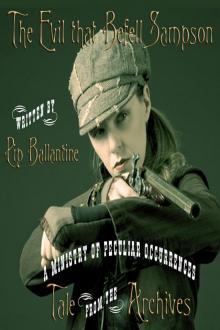 The Evil that Befell Sampson
The Evil that Befell Sampson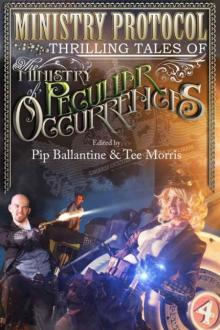 Thrilling Tales of the Ministry of Peculiar Occurrences
Thrilling Tales of the Ministry of Peculiar Occurrences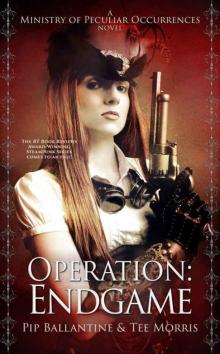 Operation: Endgame (Ministry of Peculiar Occurrences Book 6)
Operation: Endgame (Ministry of Peculiar Occurrences Book 6)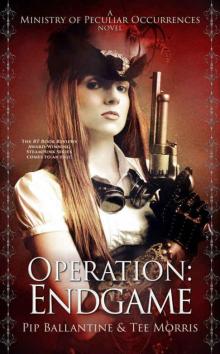 Operation_Endgame
Operation_Endgame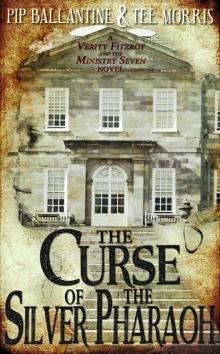 The Curse of the Silver Pharaoh
The Curse of the Silver Pharaoh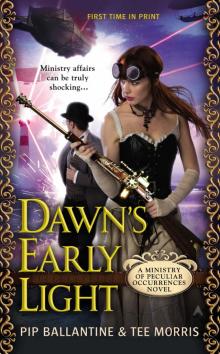 Dawn's Early Light
Dawn's Early Light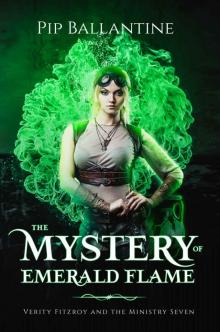 The Mystery of Emerald Flame (Verity Fitzroy and the Ministry Seven Book 2)
The Mystery of Emerald Flame (Verity Fitzroy and the Ministry Seven Book 2)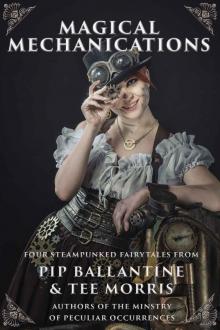 Magical Mechanications
Magical Mechanications